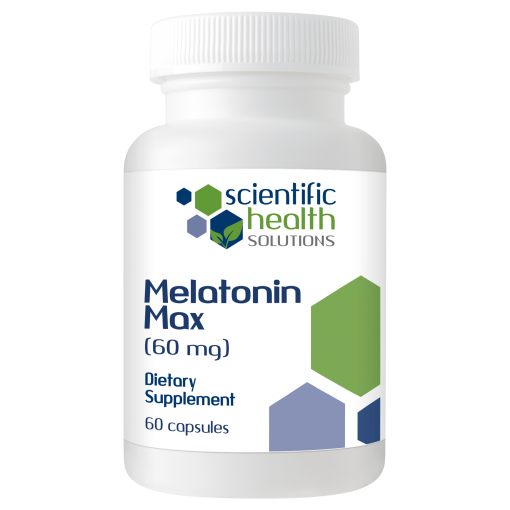A recent survey found that roughly 50 million Americans [1] suffer from “sleep disorders” and according to the Centers for Disease Control, “insufficient sleep is a public health epidemic.” If you have been on a healthy breast journey for some time, you may already know that our body can produce melatonin more effectively when you are in a darkened room.
But melatonin is not simply for sleep – it is a powerful cytotoxic hormone that has many healing properties. Keep reading to learn about the latest research on the healing properties of melatonin as well as 5 SIMPLE ACTIONS you can begin today to keep your melatonin levels up.
What is Melatonin?
Melatonin is a hormone that is produced by the pineal gland as well as in the intestines. It is found in the mitochondria and other parts of cells and plays a huge role in immune function as well as the regulation of inflammatory mechanisms. Melatonin also plays a part in the production of other hormones essential for the brain and body, such as serotonin and tryptophan [2].
Melatonin’s most important function, however, is as the regulator of the body’s “internal clock,” also called the “circadian rhythm” or the “sleep cycle [3].” Without melatonin, (as well as the pineal itself, a pine cone-shaped, pea-sized gland housed in the brain’s deep interior that is part of the endocrine system), our bodies would not know when it was night or day, i.e. time to sleep or time to wake up!
Lack of Sleep, Low Melatonin, and Breast Cancer
Melatonin is absolutely vital for breast health. First, there is an obvious connection to sleep. Disruption of circadian rhythms actually raises the risk of getting cancer, according to the Sleep Foundation [4], and this is due in large part because of the low melatonin levels that can result. This is why the International Agency for Research on Cancer (IARC) [5] classified shift work as a “probably human carcinogen” in 2007.
Lack of sleep also has a direct effect on breast cancer risk, again due in large part to low melatonin levels. One study [4] conducted between 2005 and 2008 compared 1,200 women who had breast cancer with 1,300 who did not. The researchers found that women who work night shifts had a 30% incidence of breast cancer.
Those who had done this kind of work for at least four years had the highest risk. Men who work night shifts also have a higher incidence of prostate cancer, according to a 2019 Spanish study [6] among others.
Another investigation [7] published in the journal Endocrine-Related Cancer found that individuals who worked at night under artificial lights in particular had a high risk for breast cancer. Low melatonin levels, most often caused by lack of sleep [8], also raise the risk of diabetes [9] and cognitive decline [10].
Melatonin is a Cancer Inhibitor
On the flip side, dozens of studies have confirmed that maintaining adequate levels of melatonin can directly inhibit breast cancer development and growth. Melatonin is considered a “cytotoxic hormone.” This means that it can be deadly for pathogens, including cancer cells, while at the same time, it is beneficial and essential for healthy cells.
Melatonin is a breast cancer tumor suppressor as well. Pioneer cancer researcher and Tulane University professor Dr. David E. Blask [12] is considered an “internationally-recognized leader” in the field of study known as chronobiology [13]. In particular, he studies the “neuroendocrine mechanisms by which the central circadian system in the brain regulates human cancer growth and metabolism” as it relates to “nighttime circadian production and actions of the pineal gland hormone melatonin.”
Phew, that’s a mouthful! In other words, if you want to know about how melatonin and sleep are related to cancer inhibition and growth, Dr. Blask is your guy!
What Dr. Blask has discovered over the years has been pretty remarkable. He and his team have come to the conclusion that the melatonin levels that exist in the blood while most people are sleeping (and while melatonin is being produced) can actually slow breast cancer growth by 70%! He says that this level of melatonin actually puts cancer cells “to sleep” as well!
“Nighttime Melatonin is a relevant anticancer signal to human Breast Cancers,” Dr. Blask said in a recent interview [14]. “Ninety percent of human Breast Cancers have specific receptors for this signal.”
Other researchers have used Blask’s research as a jumping-off point for discovering other ways in which melatonin inhibits cancer cells. A 2020 Iranian study [15] found that melatonin may be a cancer stem cell inhibitor as well.
What You Can Do To Up Your Melatonin Levels Naturally
For most people, melatonin production tends to decline with age. It doesn’t have to be this way, however. There are simple lifestyle changes you can make right now to start getting a good night’s sleep to maintain healthy melatonin.
#1 Cut down on blue light and EMF exposure from electronics, especially at night.
This is perhaps the most important thing you can do to get better sleep and support melatonin production in your own body. Devices such as computers, televisions, tablets, and cellphones all emit blue light as well as undetectable yet dangerously high EMFs (electromagnetic frequencies). Both blue light and high EMFs have been shown to suppress melatonin production [16] in the pineal gland and upping Breast Cancer risk. A good strategy is to take frequent breaks while you are working or scrolling. Also, make it a habit to turn off all devices and sources of Wi-Fi at least one hour before bedtime. Use soft light bulbs for reading, conversing, and getting ready for bed.
#2 Cut stress!
 As the saying goes, “stress happens” in life. The key is to have the tools in place to deal with these situations. That way once they do come, you can stay out of the stress response and avoid the damaging effects of chronic stress.
As the saying goes, “stress happens” in life. The key is to have the tools in place to deal with these situations. That way once they do come, you can stay out of the stress response and avoid the damaging effects of chronic stress.
We all know how stress can keep us up at night [17]—no studies are needed to know how that works! As a solution, begin to put into place practices that can gently and gradually reduce stress in general. This may include meditation, prayer, and time in nature. You will notice a calm presence throughout your day and will also be prepared to remain relatively calm no matter what comes your way.
#3 Eat a healthy, low-sugar, low-caffeine, whole-food diet.
When looking at diet and melatonin health, zero in on substances that may affect sleep. Besides sugar [18], which is a must to avoid, another substance is caffeine. Each individual has a different tolerance level. Be sure to choose the level that helps you and doesn’t hurt you or your sleep patterns. If you have to get your caffeine fix, consider superfoods that may contain lesser amounts of caffeine in addition to other healing phytonutrients. Matcha green tea [19], for example, contains amazing properties such as ECGC that can actually target breast cancer stem cells!
#4 Exercise regularly.
Studies indicate that regular exercise can help you sleep better and may also directly increase melatonin levels. “Accumulating evidence suggests that exercise may have both rapid and delayed effects on human melatonin secretion,” said a report published in the Journal of Biological Rhythms [20]. “Indeed, exercise may acutely (i.e., within minutes) alter melatonin levels and result in a shift of the onset of nocturnal melatonin 12 to 24 hours later.”
Put a regular exercise schedule into place for yourself. Get your heart pumping and stretch your muscles and joints daily. You will feel great and you will sleep better to boot!
#5 Supplement if you need to.
Finally, melatonin supplementation can be very helpful for those who have low melatonin levels or are struggling with sleep disorders. I suggest for anyone who wants to be “proactive with prevention” connect with their natural health provider and get their levels checked first before beginning melatonin supplementation.
There are 2 types of melatonin in our store to choose from – a small 3 mg melatonin, and slow-release melatonin. Melatonin comes in a 3 mg tablet and included B6 for healthy absorption. Slow-Release melatonin [21] comes in 6 mg tablets which are “sustain-released” throughout the evening if taken at night. All of the 7 Essentials™ products are made from quality, non-GMO ingredients.
As scientists understand the benefit of melatonin on chronic diseases, some doctors are advocating high doses of melatonin, as high as 180 mg per day!
Here is an interesting Youtube video featuring Dr. Frank Schallenberger speaking at a cancer conference.
Commit to a Healthy Breast Lifestyle and Healthy Melatonin Becomes Easy!
Odds are, if you follow the above recommendations, your sleep is going to be greatly improved naturally and automatically. Getting enough deep sleep to produce healthy amounts of melatonin is a must-do for anyone on a healthy breast journey.
So turn off that computer and snuggle into bed (preferably before ten when that “second wind” usually hits. Then prepare for the best sleep of your life. In the morning, you will know that you have just restored your melatonin levels and upped your Breast Cancer protection mechanisms to boot!
Dr. Veronique Desaulniers, better known as Dr. V, is the founder of The 7 Essentials System ™, a step-by-step guide that teaches you exactly how to prevent and heal Breast Cancer Naturally. To get your F.R.E.E. 7-day mini e-course, and to receive her weekly action steps and inspiring articles on the power of Natural Medicine, visit https://breastcancerconqueror.com
